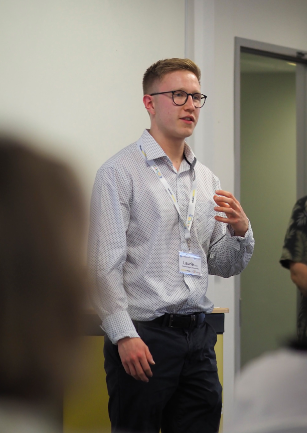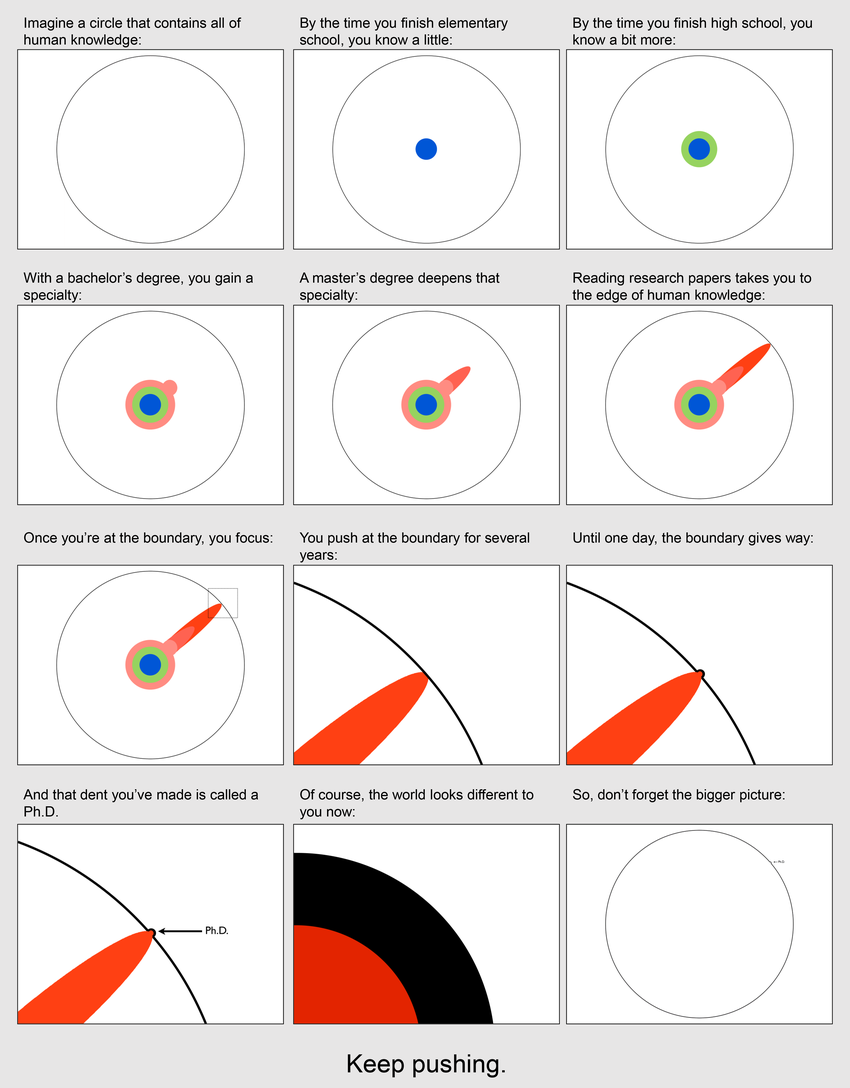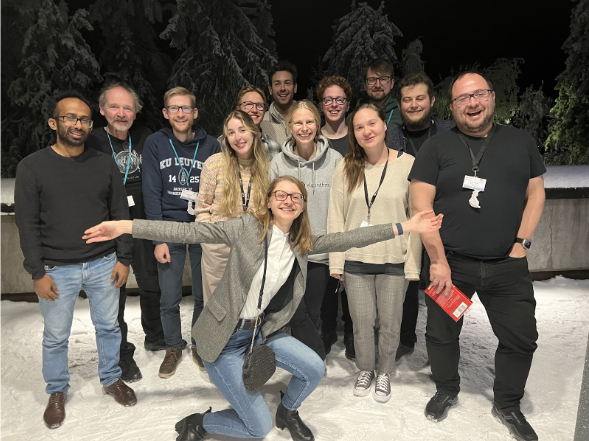With almost a year and a half at the research centre under my belt, it feels a fitting time to look back on the PhD journey so far and share some reflections and advice. This may be useful for anyone considering applying to a PhD, or interested in what PhD life is like.

What actually is a PhD?
Formally, a Doctor of Philosophy is a research qualification that investigates a very particular area of research, culminating in a thesis with as many words as a decent fantasy novel. The aim is to become an expert in some tiny part of research; your job is to contribute some new knowledge to the world. This contribution to knowledge may be very minuscule (as shown below), but a contribution nonetheless.

Essentially, a PhD represents learning how to be a researcher. I like to think of it as a large-scale undergraduate/Master’s dissertation, taking at least three years full-time instead of a few months part-time.
The joys
For me, the PhD represents my first full-time experience in academia, which has been an absolute joy on the whole. I’ve condensed the highlights into three main points, otherwise you’d be reading for a while:
1. The nature of research
To me, the essence of research is advancing knowledge to make a positive change to the world. This often means building on the work of others who have conducted similar research. Since computing education is still in its infancy as a research area, there aren’t so many people whose work directly relates to my research. This gives me the feeling that my research is stepping into somewhat unchartered territory, which is a real privilege. Finding something new about this territory excites me.
2. Conferences
A typical part of a researcher’s calendar is attending conferences, where you hear like-minded people present their often fascinating research. I’ve attended three so far, meeting more people and talking about my research more times than I can recall. It’s hard to express how gratifying it feels for others to be interested and excited about your research. It gives a sense of encouragement to keep going, helping to build a sense of community. In computing education, this community is strong, extremely welcoming, and full of supportive people.

3. Visiting schools
As part of my research, I’ve visited several local primary and secondary schools to get a feel for how computing is actually taught in school. This is always something I look forward to, particularly when students get so excited about learning computing. I’ve also learnt that not every problem in the classroom is echoed as loudly in research. For instance, many teachers I’ve spoken to have complained of a lack of time to teach programming, but I don’t see much research focusing on this.
The challenges
Like anything in life, PhDs are not without their challenges. Perhaps the biggest two I’ve experienced relate to the long-term nature of it.
It’s not a secret that the workload can sometimes be overwhelming. During busy term times, there are many plates to keep spinning, which can (and does) become stressful. I’ve had a couple of particularly busy times, but want to highlight that most of the PhD has not been like this. To help cope with this stress, getting the right personal and academic support is key – my supervisor and peers always support me through the hard times. Planning helps too; it will help to prevent the very busy periods in the first place.
I’ve also had to realise that mastering research is a slow process. There’s much more to learn than originally meets the eye, which is both frustrating and humbling. While it’s inevitable that mistakes will be made in the PhD, it does mean more work has to be put into research projects than you initially envisage, which, again, can get stressful when deadlines are looming. From these experiences, I’ve learnt that new things take more time to complete than I anticipate and to prepare accordingly.
Some see PhDs as a lonely enterprise due to the independent nature of the work. While this claim is valid, this has not been my experience. Contrarily, I’ve much enjoyed the freedom of having autonomy over my work. Being surrounded by the right people helps too. For me, my colleagues at the research centre give me a sense of camaraderie. While my PhD is my own, its mission of making computing accessible for all is the same as their research, helping to shake off any feelings of isolation.
Final reflections
Some see PhDs as some of the most intense and stressful years of an academic’s life. While there are certainly hard times (much like anything worth doing), in my experience, there has been far more fascination than frustration. To deeply think about a particular research topic is thoroughly enjoyable and has allowed me to meet some fantastic people along the way.
I’m looking forward to seeing where my research takes me during and beyond the PhD. In the meantime, there’s plenty more thinking, reading, writing, school visiting, and more to be done.
For anyone considering applying, I’d encourage you to give it a go. If there’s something in the world that captivates your interest and you want to improve, a PhD is the chance to take a deep dive into it. You’ll learn more than you can imagine along the way.